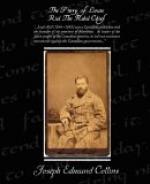“We have the arms, and we are determined to move against that presumptuous nest of domineering banditti. If you do not lead us, then the command will have to fall upon one of ourselves, and there is no man amongst us who has had any experience in leadership.”
“How are your numbers made up?”
“We have nearly a hundred immigrants, and about double that number of English-speaking half-breeds.”
“I consent to your request, but you must distinctly know that I do so altogether against my own judgment. Against my judgment only, however, not against my inclinations.” Very speedily the force was marshalled together, and organised in rough shape. Winter now reigned in all its severity upon the plains. Recently snow had fallen, and without snow shoes it was next to impossible to march. The arms of this crudely-disciplined band, as may be imagined, were not of the most approved pattern. Some of the half-breeds had flint-locks, and their highest average of “going-off” capacity was about 33 1/3 per cent. That is to say, out of three snaps you got the piece “off” once. The miscarriages were made up of “missing fire” and “burning prime.”
Now, while this dangerous army was marching toward Fort Garry, Riel, on the advice of his military chief, Lepine, had liberated the prisoners. Many of the latter tarried not long on the shadow of the rebel stronghold. Thomas Scott learned, on leaving the stockade, that a heavy force was proceeding to the Fort to overthrow the rebels, and made all haste to join the loyalists.
Major Boulton was not without some definite and even commendable plan of procedure, much as he has been criticised by those who always show their wisdom after the event. To young Scott he detailed his programme.
“My ambition is,” he said, “to delude the rebels as to my movements, by affecting a desire to treat with them. Therefore, I shall halt with my forces a short march from Fort Garry, and when I have lulled suspicion, I will make a dash, in the night, trusting to the suddenness and vigour of the onset for success.” Such a proceeding Scott strongly approved, and Major Boulton found that the young man’s knowledge of the rebels’ condition would be of the greatest value to the enterprise. So with considerable enthusiasm the force marched on. Now, however, the sky became a sullen indigo, and flakes of spitting snow began to drive out of the east.
“I have some fear of that sky,” the commander said to his followers. “If more snow comes, there is an end of the march.” All day, and through the night and during the next day, the storm raged, covering the prairie with four feet of soft snow. Riel’s scouts had given warning of the approach of the loyalists, and every man in the fort seized a fire arm, ready to march instantly upon the besiegers. The ruffianly O’Donoghue was fairly in his element.
“Boy hivins and airth,” he said, “but it’s moyself that’s itching to get at those lick-shpittle loyalists. Veeve lah Republeekh,” he shouted, tossing his filthy hat, “and God save Oirland.”




